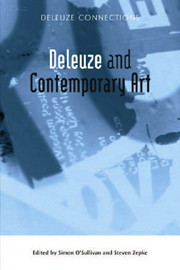Book contents
- Frontmatter
- Contents
- Acknowledgements
- List of Illustrations
- Introduction: Deleuze and Guattari and Contemporary Art
- POLITICS
- THE AESTHETIC PARADIGM
- 5 Capitalism and Schizophrenia and Consensus: Of Relational Aesthetics
- 6 The Practice and Anti-Dialectical Thought of an ‘Anartist’
- 7 Ethologies of Software Art: What Can a Digital Body of Code Do?
- 8 Fractal Philosophy (And the Small Matter of Learning How to Listen): Attunement as the Task of Art
- SCENES AND ENCOUNTERS
- TECHNOLOGIES
- Notes on Contributors
- Index
6 - The Practice and Anti-Dialectical Thought of an ‘Anartist’
from THE AESTHETIC PARADIGM
Published online by Cambridge University Press: 12 September 2012
- Frontmatter
- Contents
- Acknowledgements
- List of Illustrations
- Introduction: Deleuze and Guattari and Contemporary Art
- POLITICS
- THE AESTHETIC PARADIGM
- 5 Capitalism and Schizophrenia and Consensus: Of Relational Aesthetics
- 6 The Practice and Anti-Dialectical Thought of an ‘Anartist’
- 7 Ethologies of Software Art: What Can a Digital Body of Code Do?
- 8 Fractal Philosophy (And the Small Matter of Learning How to Listen): Attunement as the Task of Art
- SCENES AND ENCOUNTERS
- TECHNOLOGIES
- Notes on Contributors
- Index
Summary
In Jacques Rancière's ‘aesthetic regime of art’, art is conceived of as a specific activity that suspends the ordinary spatiotemporal coordinates and connections of sensory experience and their dualisms of activity and passivity, form and matter, and sensibility and understanding. These dualisms, which Rancière claims constitute the ‘distribution of the sensible’, are political in the sense that they determine social hierarchies according to relationships of domination between those of ‘refined culture’ (the active) and those of a ‘simple nature’ (the passive), the power of people of leisure (liberty) over those who work (necessity), and the power of the intellectual working class (autonomous) over the class of manual labour (subordination).
This notion of art as a heterogeneous ‘specific sensorium’, opposed to the conception of work as domination, carries with it the promise of the abolition of the separation between ‘play’ and ‘work’, between activity and passivity, and between autonomy and subordination. These two different modalities, which in reality are two different politics of aesthetics, continue, according to Rancière, to inform the politics of art. In the first case (art becoming life), art is political in the sense that it abolishes the distinction between art and life by doing away with the notion of art as a separate activity. In the second case (resistant art), art is political in the sense that it carefully maintains this very separation, as a guarantee of autonomy from the world of merchandise, markets and capitalist valorisation.
- Type
- Chapter
- Information
- Deleuze and Contemporary Art , pp. 100 - 115Publisher: Edinburgh University PressPrint publication year: 2010



